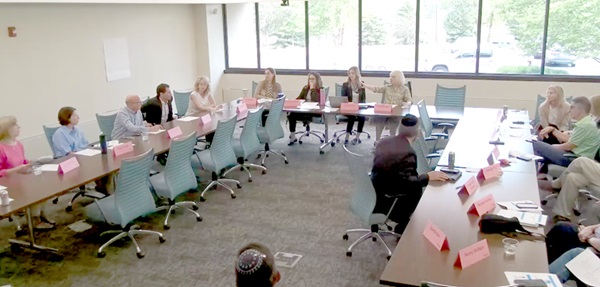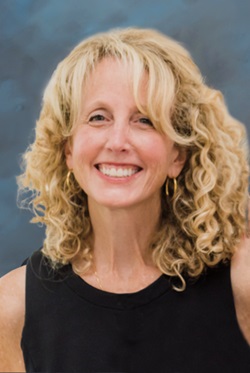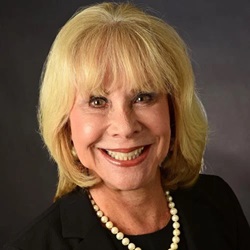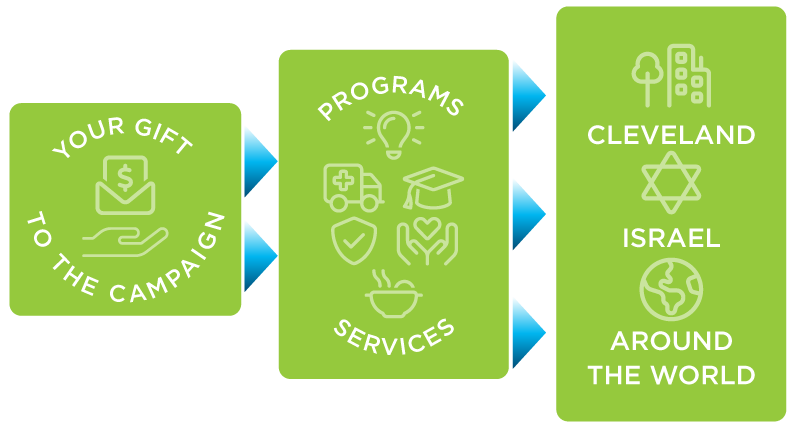07/11/2024
Federation Task Force Addresses Concerns of Aging Seniors

The Jewish Federation of Cleveland's Older Adult Task Force's last meeting was June 17 at the Federation's offices in Beachwood. Submitted photo.
ABIGAIL PREISZIG | CJN
Article reprinted with permission from Cleveland Jewish News
Adhering to its longstanding commitment to the needs of the Jewish community, the Jewish Federation of Cleveland is spearheading a task force to address gaps in older adult care in light of changes both locally and nationally.

Bichsel
Consisting of 27 thought leaders and organizational representatives, the Older Adult Task Force began meeting in January to identify gaps, create programing and prevent future strain on Jewish adults ages 65 and older and their caregivers.
“The Jewish community and Jewish Federation have always been concerned about the Jewish elderly,” Susan Hurwitz, task force chair, told the Cleveland Jewish News June 27. “This is historic, it goes back one-hundred-and-some years. They were aware that things are changing (again).”
An acute change occurred in December 2023, with the sale of Menorah Park, the area’s Jewish senior living campus, to New Jersey-based Outcome Healthcare, she said. Founded in 1906, Menorah Park, now King David Healthcare Center, served the Cleveland Jewish community on its Beachwood campus for 55 years, the CJN previously reported. The more than 23-acre senior living campus was supported by two nonprofit foundations and, with the sale, is now a for-profit organization.
“I think most of the community agencies … all were wanting to come together and were very much thinking about the needs of older adults following the sale of Menorah Park,” Susan Bichsel, president and CEO of Jewish Family Service Association of Cleveland in Pepper Pike and a member of the task force, told the CJN June 27. “We all serve older adults and were looking to start a community conversation about how we were to move into the future in terms of serving the needs of older adults now that we didn’t have an organized community campus.”

Hurwitz
First, the task force did a “major landscape study,” creating a grid of existing agencies and services in the area, Bichsel and Hurwitz said. Then, the members had conversations with community nonprofit care providers, both Jewish and non-Jewish, to gauge the scope of older adult care available regionally.
Next, the task force spoke with businesses nationally that provide long-term care and services to seniors, Bichsel said. Those conversations are being “collated” to determine national and local trends and the greatest needs to “inch” toward identifying and addressing those gaps, she added.
“We’ve got a nice panoply of the steps and lengths of services that are provided either by the city, the county, private sources or nonprofits,” said Hurwitz, a volunteer on issues related to aging in the Cleveland Jewish community for over 30 years.
Moving forward, the task force will meet with seniors and their caregivers, host focus groups and conduct individual interviews with seniors to learn how they perceive what resources are available or lacking, she said.
“Once we have all this information, the group will prioritize what seems to be the most critical gap (and) what we can do about it,” Hurwitz said. “We don’t anticipate that the community is going to be able to fill all the gaps, but we certainly hope that we will be able to take care of the needs of the Jewish people in our community.”
From there, the Older Adult Task Force will create recommendations for investments to be carried out by various agencies or individuals, Bichsel said.
Those recommendations will go to the planning committee at the Federation which will make suggestions to the board of trustees, Hurwitz said. She expects this part of the work to occur this fall, although urgent needs, particularly those involving Holocaust survivors, will be addressed sooner.
Identifiable gaps for seniors thus far include cost of living or availability of affordable living, social isolation, access to transportation and a shortage in qualified caregivers that was exacerbated during the COVID-19 pandemic, Hurwitz said.
In addition to Hurwitz and Bichsel, the task force is comprised of professionals from local organizations including Mitchell Balk, founding president of the Mt. Sinai Health Foundation; Melanie Halvorson, vice president of community planning and allocations at the Federation; Ellen Miller, senior director of community services at Access Jewish Cleveland; Rabbi Carnie Rose, CEO of the Mandel Jewish Community Center of Cleveland; and Emily Shapiro, senior associate of planning and evaluation at the Federation; and lay leaders, Sue Borison, Dr. Howard Epstein, Rabbi Akiva Feinstein, Dr. Michael Frankel, Allan Goldner, Kathy Hexter, Larry Mack, Ken Marblestone, Kevin Margolis, Dr. Bradley Marino, Margie Newman, Cameron Orlean, Dr. Michael Pollack, Keith Polster, Rick Rivitz, Cathy Stamler, Seth Vilensky, Judy Willensky, Idelle Wolf and Renny Wolfson.
“A lot of us have always served older adults in different ways …” Bichsel said of the task force. “It’s imperative now for us to really make sure that we all have a working understanding of where those places are, and in what ways individuals are being served at the various agencies so that we can identify where the gaps exist today and where people can go for services across our Jewish agencies. Then, that helps us also figure out what doesn’t exist and what we might want to build.”
Marblestone, board chair of the Menorah Park Foundation, which previously supported Menorah Park’s senior living campus with the Montefiore Foundation, is excited to be involved in the new task force, a representative from the Federation said in an emailed statement to the CJN July 9.
With the sale of the campus, the foundations shifted from fundraising to grant-making organizations, the CJN reported in February.
“They look forward to utilizing the task force’s findings and recommendations as a part of the Foundation’s grantmaking initiatives, which will be focused on improving the quality of life of Jewish older adults in Northeast Ohio,” the representative said.
Feinstein, the director of spiritual living at King David Center who previously served residents at Menorah Park, was appointed to the task force for his 17 years of experience providing spiritual care and chaplaincy within medical settings and vast experience working within the local older adult community, the representative said.
Organizations have seen success from similar task force efforts by the Federation, Bichsel said. For example, in 2007, the Community Options Task Force, also chaired by Hurwitz, helped create programming for older adults aging in place. And in 2013, the Nakum: Alzheimer’s/Dementia Task Force formed to address the needs of families affected by Alzheimer’s disease or dementia.
“From that we launched a significant program within JFSA, a dementia and Alzheimer’s program, and that has been very successful,” Bichsel said, adding that the program has now served over 1,000 individuals due to the large community effort and received a federal grant. “So, these planning processes have proven successful in the past, so I am hopeful.”
Additionally, the Federation already provides a free and confidential resource and referral service, Access Jewish Cleveland, Hurwitz said. This includes information on Alzheimer’s disease and dementia resources and care for aging parents.
For more information, on Access Jewish Cleveland, visit accessjewishcleveland.org or call 216-292-4636.
TOGETHER, we help save and change tens of thousands of lives in Cleveland, Israel, and around the world. Thank you!


